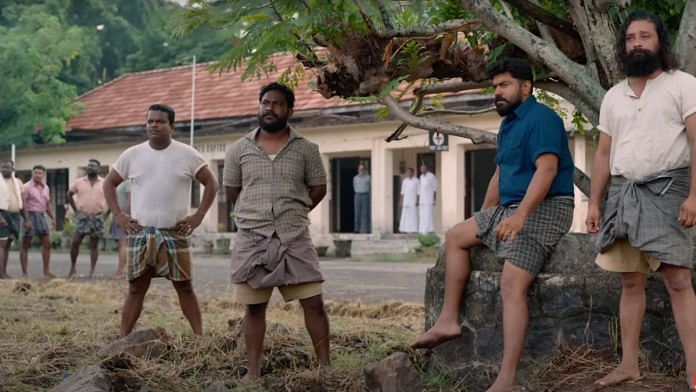Thuramukham is unmistakably a Rajeev Ravi movie. The three-hour runtime is your first clue and the stunning visuals, your second. The director-cinematographer immerses you in the workers’ struggle of the 1940s and ’50s in the port town of Mattancherry.
Those expecting Thuramukham to be a mass entertainer may be disappointed. But if you’re patient enough to withstand the slow burn, Ravi delivers sparks.
The ensemble cast — Nivin Pauly, Arjun Ashokan, Poornima Indirajith, Joju George, Nimisha Sajayan, Indirajith Sukumaran, Sudev Nair — deliver stellar performances.
But in true Communist fashion, there is no single hero. Even the fiery speech in the climax is delivered by a minor character who grows to be a leader and isn’t even on the film’s poster. The workers’ struggle remains the star.
Casual cruelty
Thuramukham begins in black and white. Maimood (Joju George) and his neighbours are off to find a day’s work at the harbour. They gather in a throbbing crowd being held back by a whip-wielding Pacheek (Sudev Nair). Then the chaos begins — the boss throws chappas (tokens) into the crowd. Those who catch it are employed, just for the day; tough luck for the rest.
The chaos is contrasted with the calmness of those seated on the elevated platform. The lack of colour and sharp shadows keep the focus on this casual cruelty.
Joju shines in the first mass scene of the film, but Ravi does not indulge in drama for the sake of it. He shows the simmering of the pot before it boils over. Later, Maimood asks his wife, an unnamed Poornima Indrajith, if she will care for their three kids after his death. With some hesitation, she says yes.
The opening credits stand in for time passing. Maimood is dead and Pacheek is now the boss — a union boss. Pauly plays Moidu, his right-hand man and Maimood’s son.
If this was a regular movie, this is where I would tell you that the story follows Moidu, but this isn’t and it doesn’t.
Also read: Oscar-nominated Tár is a Cate Blanchett show from the get-go. She will thrill you, stun you
Non-verbal cues
Unions may exist but they’re still helmed and controlled by bosses. Moidu follows Pacheek unquestioningly. Ashokan plays Maimood’s second son, Hamza. The two brothers are on opposite ends of the conflict and are also part of a love triangle. But even here, there’s no explosive — or emotionally manipulative — familial drama viewers might expect.
Hamza is apprehensive about supporting the workers’ union, although it’s never verbally expressed. Ashokan’s acting speaks for itself. Hamza’s dedication to the cause too is declared through actions — he stands between a union leader and his brother’s dagger.
As for the love triangle, Umani (Nimisha Sajayan) gets the say but this choice is not romanticised. Ravi knows her choices are not ideal and makes sure the audience knows it too.
The women in the film may not be the focus, but their characters are fleshed out. Poornima delivers the strongest performance of the film.
A scene that stands out is when her daughter (Darsha Vijayan) comes back home for the first time after her marriage. She’s sick and barely able to stand. Here, too, Ravi shows and not tells. The women lock eyes and Poornima knows exactly what her daughter has been through. She looks up at the sky in defeat.
Little satisfaction
The film is visually stunning, every frame a painting. When there is no colour, you don’t miss it and when there is, it’s used purposefully.
The narrative is repetitive, but it’s a conscious choice — workers gather, chappas are thrown, fights break out, it’s a cycle. It’s not easy viewing, perhaps it’s not meant to be.
With that being said, Thuramukham could have benefited from some more time in the editing room. Its ambition does get the better of it sometimes.
In the climax, Ravi paints the town red, in more ways than one. It’s not an ending that a viewer is conditioned to expect but perhaps is more impactful. You don’t leave the theatre satisfied, but I think that’s by design.
(Edited by Prashant)



